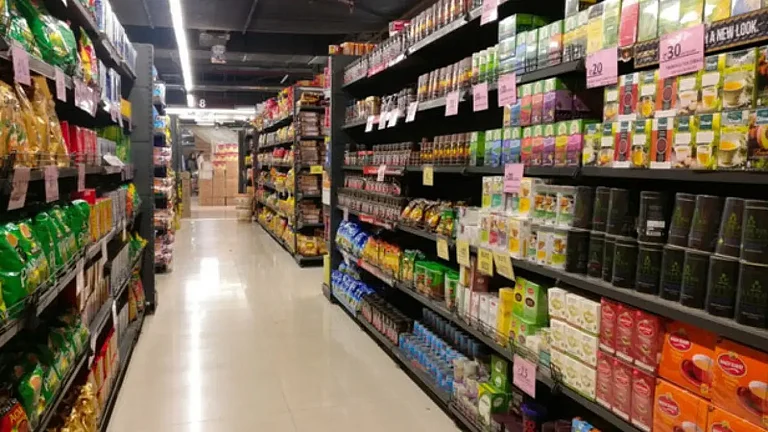India’s rural markets are significantly contributing to the ongoing growth of the FMCG [fast-moving consumer goods] sector, which is majorly driven by rising rural consumption. Over the years, improved agricultural productivity and better rural incomes have significantly enhanced the purchasing power of rural households. Meanwhile, favourable monsoons have further contributed to good crop yields, while lower inflation has increased affordability for essential and non-essential goods. Together, these developments have positioned rural India as a dynamic market, with FMCG demand growing 300-400 basis points faster than urban areas.
Rural India is emerging as a key driver of FMCG growth, supported by increased digital adoption and rising brand consciousness. With approximately 65% of India's population residing in rural areas, this demographic presents vast opportunities for FMCG companies. Digital connectivity is reshaping consumer behaviours and the rural internet user base is projected to reach 900mn by 2025, with 53% of users from rural areas. This growth has encouraged companies to adopt innovative marketing strategies, emphasising health, wellness and sustainability, while leveraging local languages and digital tools to engage effectively with this dynamic market.
FMCG companies are capitalising on this growth by expanding their footprint to over 1,22,000 villages. This expansion goes beyond driving sales. It is also creating thousands of jobs in sales, logistics, distribution and supply chain operations. The surge in rural consumption, reflected in the increase of average FMCG basket size from 5.8 categories in 2022 to 9.3 in 2024, highlights the need for skilled, multi-functional workers who can manage diverse responsibilities. By building a workforce capable of supporting complex rural supply chains and engaging effectively with local communities, FMCG companies are not only boosting their operational efficiency but also contributing to the socioeconomic transformation of rural India.
Supporting Rural Operations
To address the specific needs of rural markets, FMCG companies are increasingly hiring versatile employees, particularly in Tier-II and Tier-III cities. These multi-skilled workers easily engage with rural consumers and retailers, ensuring efficient product delivery in areas with limited infrastructure. They also play a crucial role in navigating complex supply chains. For example, field sales representatives in urban markets typically operate within a 2-5 km radius on a bike, serving around 30-35 retail outlets, and this is followed up with a delivery service basis the orders generated.
Whereas in rural areas, salespeople must cover significantly longer distances and manage to cater to only 10-15 shops per day. Given the lower store coverage compounded by the lower per-store order value in rural markets, companies cannot afford to assign separate personnel for different tasks, necessitating a single representative to handle multiple responsibilities efficiently. Additionally, due to the higher costs associated with revisiting the same area, sales and distribution personnel should complete all tasks in a single visit to each area. Hence, sales and delivery functions have been blended into one—van sales representatives—to sell and deliver the goods on the spot, covering the route in a van rather than a bike.
Investing in Workers
FMCG companies are responding to the evolving dynamics of rural markets by investing significantly in upskilling their workforce. These efforts aim to prepare employees for multi-functional roles that blend traditional and modern retail practices.
FMCG companies are facilitating technology-driven learning to make training more accessible in remote areas. Digital content, gamification and localised training modules in native languages ensure that workers in rural areas can upskill effectively. This strategy is particularly beneficial in creating a workforce that can seamlessly manage online and offline channels, an essential requirement in today’s omnichannel retail environment. Technology not only bridges the training gap but also accelerates the pace of learning and adaptation in rural markets.
Many companies are investing in upskilling initiatives to equip workers with the versatility needed for multi-purpose roles. Van sales representatives, who play a key role in connecting brands with customers in both urban and rural markets, face unique challenges that require upskilling. To address this, companies are introducing programmes focused on advanced driving, digital sales tools and communication skills to help them explore new markets and boost growth.
FMCG companies are also enhancing adaptability across their workforce by offering training in sales, operations and digital tools. Additionally, partnerships with government initiatives like Skill India and private institutions are helping rural workers develop digital literacy, communication and problem-solving skills.
The rural Indian market is rapidly transforming into a cornerstone of FMCG growth. With rural consumers becoming more connected, health-conscious and brand-aware, companies that adapt authentically stand to reap significant benefits. Success lies in understanding the unique needs and aspirations of rural communities while creating strategies that resonate with their evolving lifestyles.
However, challenges such as infrastructure limitations and diverse cultural landscapes demand innovative approaches. FMCG companies that embrace digital platforms, innovate in distribution and build strong community connections can lead this transformative shift in the rural market. Companies are addressing the complexities of these markets by investing in multi-skilled workers and implementing innovative upskilling programmes. The sector's growth is reflected in the increasing demand for fresh talent, with hiring intent for freshers projected to rise to 32% in the second half of 2024. The rapid expansion of the food processing industry, a vital part of FMCG, is creating substantial job opportunities as the Indian processed food market is expected to reach $470bn by 2025. By aligning corporate ambition with rural prosperity, FMCG companies are gradually contributing significantly to India’s economic landscape.
The writer is senior vice-president and business head at TeamLease. Views are personal.


























